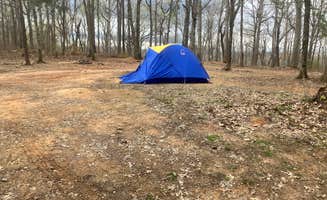Rustic camping near Albemarle, North Carolina offers opportunities within the Uwharrie Mountain range, which despite modest elevations averaging 600-800 feet, contains some of the oldest mountain formations in eastern North America dating back 500 million years. The surrounding national forest encompasses over 50,000 acres with numerous trails connecting primitive campsites throughout the region. During spring and fall, temperatures typically range between 40-75°F, making these seasons ideal for overnight wilderness stays.
What to do
Off-road adventures: The Uwharrie National Forest trail system provides extensive options for OHV enthusiasts. "We also took our Jeep on the OHV trails and had a blast. There are several places you can take a canoe or kayak on and the scenery on the lake was beautiful as well," notes Erica who traveled 5 hours to experience the area.
Kayaking access points: The Little River section offers water-based camping options. "Me and my friends would always float our kayaks down the river to a place we called 'Bird Dog' and camp for the night. If you are looking for a place that has very little traffic, this is the place you want to go," shares Wyatt M. about this quieter section of the forest.
Wildlife observation: Many areas of the forest serve as hunting grounds during season but offer wildlife viewing opportunities year-round. "This area was a place that I went often to deer hunt in the fall. I have never came across another camper/hunter at this location. It is a good location if you are looking for an area that is away from camp grounds and heavy traffic," according to a frequent visitor.
What campers like
Stream proximity: The abundance of water sources throughout the region makes primitive camping practical. "Water available on both sides of camp / trail," notes Wayne R. about sites along the Uwharrie trail, making these locations ideal for longer stays.
Trail connectivity: The extensive trail network allows for various backpacking routes. "The Uwharrie Trail, which pretty much spans the park north/south is about 20 miles point to point. The streams, provided one has filtration or iodine tablets, provide ample sources of drinking water," explains a backpacker who regularly explores the region.
Quiet atmosphere: Wilderness areas provide genuine seclusion. "Had a good time camping and enjoyed the song of wind and birds," shares Daniel R. about his experience at the Falls Dam Trail area, where natural sounds replace urban noise.
What you should know
Permit requirements: Overnight permits are necessary for certain areas. "There are a 6 different stores/gas stations that have the overnight passes available for purchase. We got our passes from Eldorado outpost and the attendants there were very knowledgeable and helpful," advises a regular visitor.
Trail conditions: Some routes require preparation and careful navigation. "The trailhead is kind of hard to follow sometimes, sections of the trail are prone to flooding and creek crossings can become difficult following heavy rains," warns Sean R. about the main trail system.
Site maintenance: Camper responsibility is essential for preserving these areas. "It's pretty popular so head out early to secure your spot. Some of the sites may have a little trash left from the last user, so please try to leave it cleaner than you came to," recommends a frequent dispersed camper.
Tips for camping with families
Site selection: For family camping trips, choose areas with clearer access. "The tent sites nice and clean and level. The host drove through many many times in the 3 days I was there," reports a camper who appreciated the regular monitoring of developed areas.
Trail difficulty: When hiking with children, consider the terrain carefully. "Very nice trails. Well maintained. Not marked the best... signs at intersections. Plenty of creeks," notes a hiker about the Birkhead Mountain area trails, suggesting families should bring detailed maps.
Vehicle requirements: Access to more remote camping spots often requires appropriate vehicles. "This is a great area for dispersed campers with 4WD or AWD. Most sites have rock fire pits and room to set up," advises an experienced visitor, pointing out that family camping may require off-road capability.
Tips from RVers
Generator options: Some rustic areas allow for minimal RV setups. "We used our pop-up with a generator in rustic locations. There are hiking, horse, OHV, dirt bike, ATV, and mountain bike trails," shares a camper who successfully combined RV comfort with primitive camping.
Site accessibility: RV camping options are limited but possible in specific locations. "This is not an RV camping area, at least not the dispersed camping area. You cannot drive up to the campsites. There are no electric, water, or sewer hookups," cautions a visitor about expectations for vehicle-based camping.
Bathroom facilities: RVers should note the limited amenities. "Bathrooms are what you can expect from a state park clean with little bugs here and there but nothing you can do about that in the middle of the woods," explains a camper who stayed at one of the more developed areas that accommodate vehicles.



